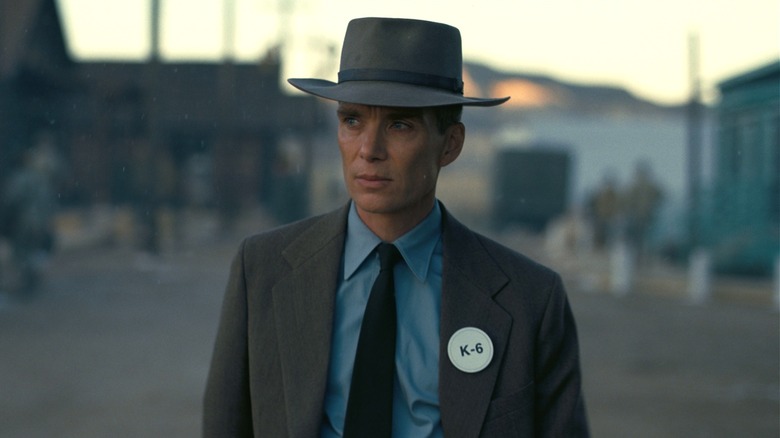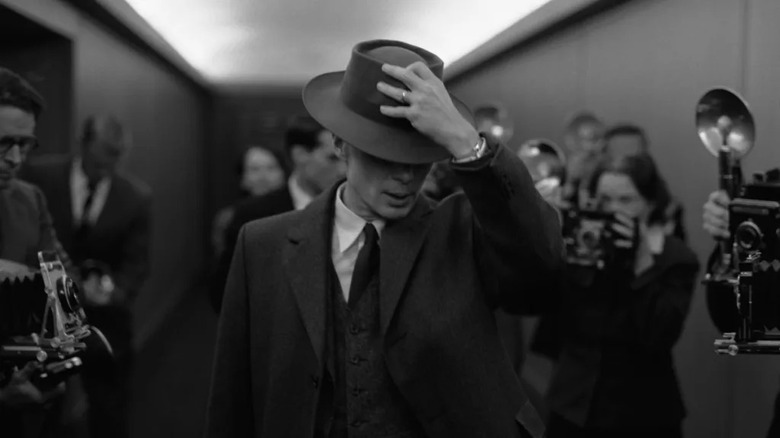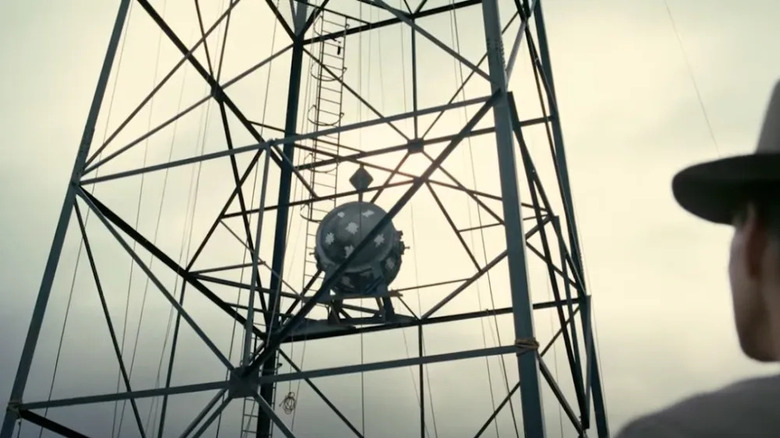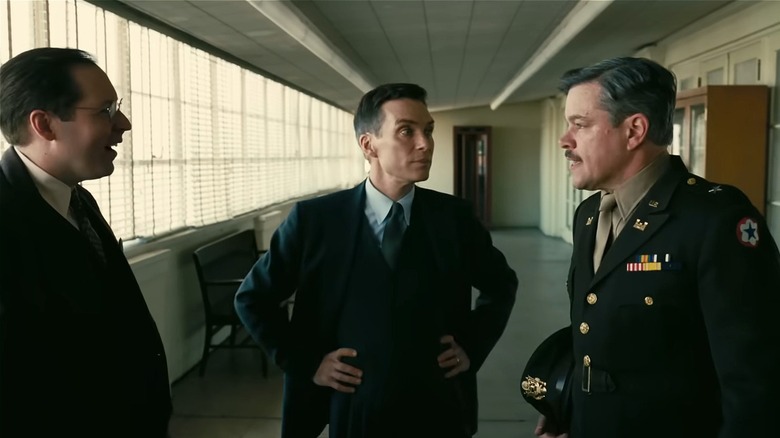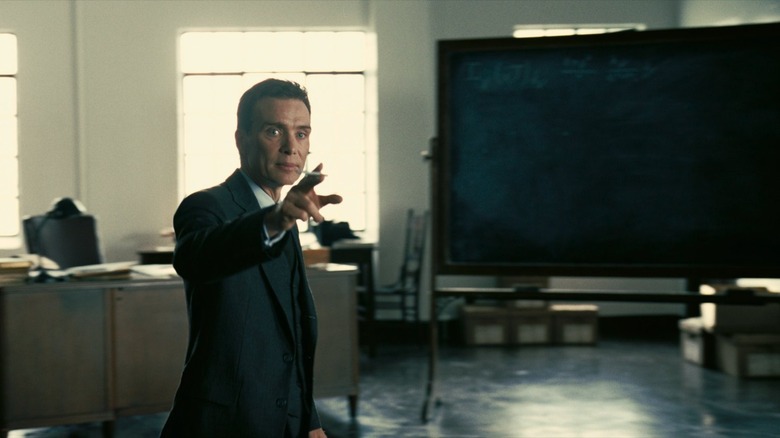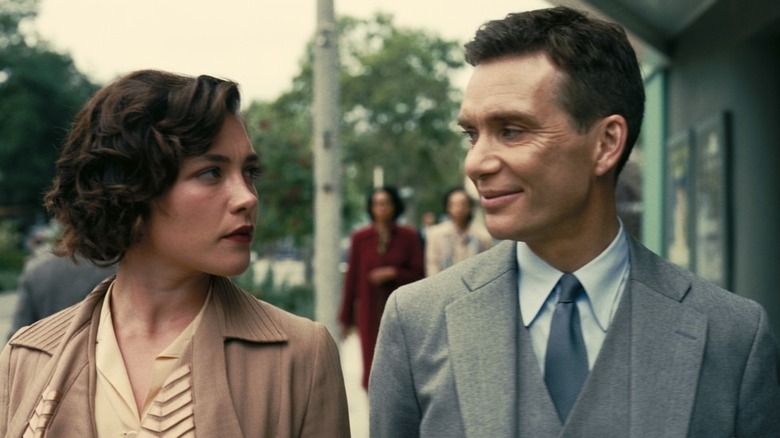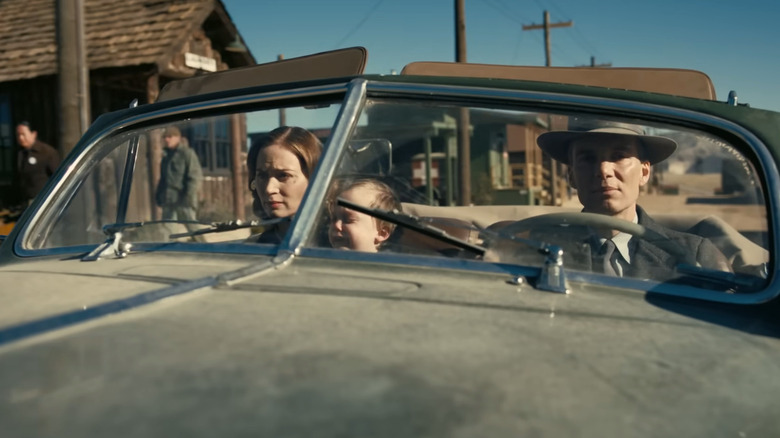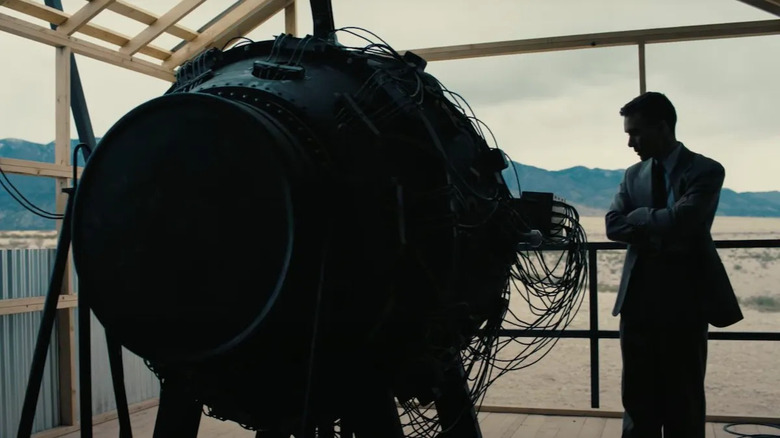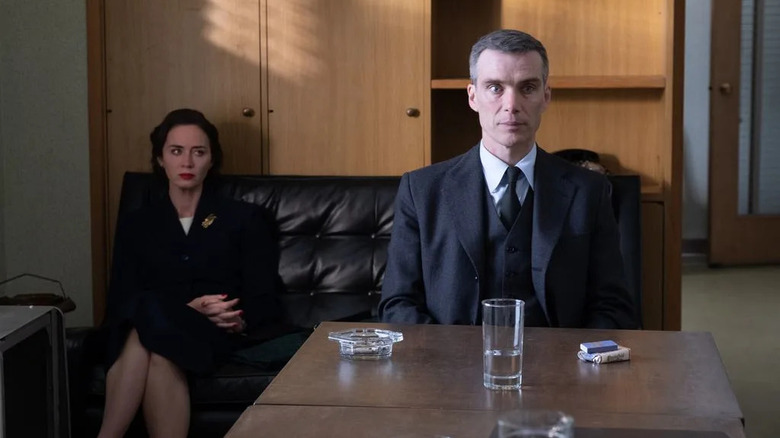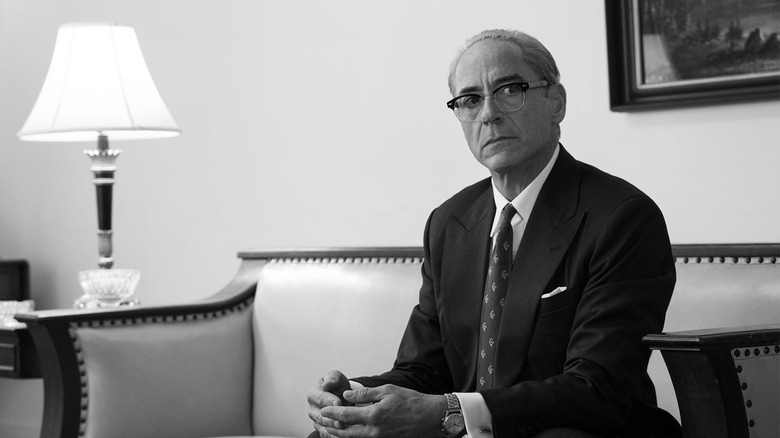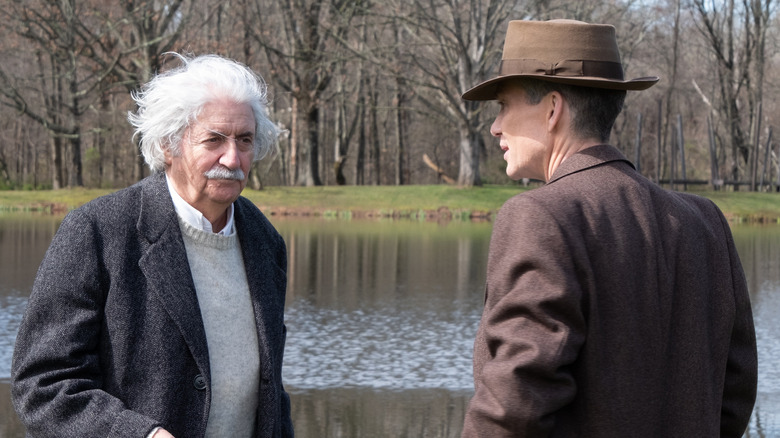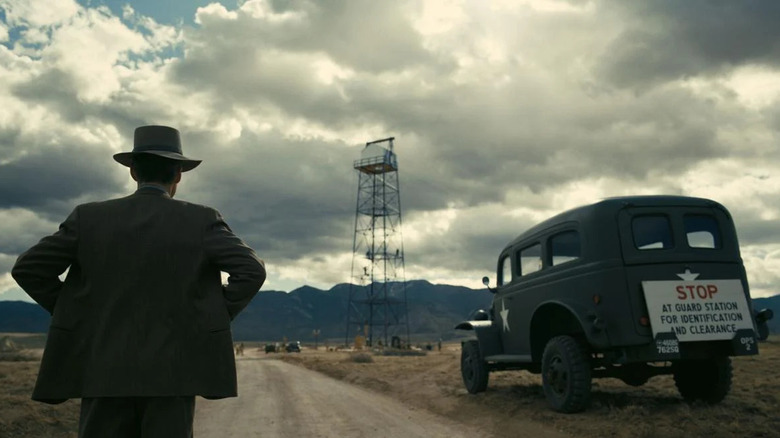Oppenheimer's Most Confusing Moments Explained
The latest film from director Christopher Nolan — "Oppenheimer" — has finally arrived to take audiences back to one of the most life-altering moments in human history. The film follows J. Robert Oppenheimer (Cillian Murphy), a renowned and talented physicist who's brought onto the Manhattan Project in WWII to help the U.S. create the atomic bomb. As Oppenheimer's vision for this destructive weapon starts to become realized, he's forced to face the repercussions of his creation as well as his complicated past — both of which make him a dangerous entity.
Led by a fantastic performance from Murphy, "Oppenheimer" is one of Nolan's most captivating, suspenseful, and emotional films to date. The story of Oppenheimer is excellently split into two timelines that build suspense around Oppenheimer and his team crafting the bomb, as well as a slow-growing plot to bring his transgressions to light. Not to mention, there are plenty of intense visuals and scientific discussions that immerse viewers deeper into the experience. With so much happening throughout "Oppenheimer," there are plenty of elements to the story that could leave viewers feeling a little perplexed. That's why we're here to delve into some of the film's most confusing moments and see if we can make heads or tails of them.
Things are pretty black and white
Christopher Nolan is no stranger to depicting time in unique ways and "Oppenheimer" is a great example of that. The film is told through two distinct timelines — one focused on Oppenheimer's rise and another looking at Lewis Strauss' (Robert Downey Jr.) attempts to tear his rival down. To distinguish these two timelines, Nolan depicts Oppenheimer's view in color while Strauss' is in black and white. Now, while this could be to make it clearer to audiences that these storylines aren't happening at the same time, it feels like Nolan is attempting to do something more with this that he doesn't fully achieve. The underlying meaning of these color changes doesn't feel present and it's so unclear that Nolan had to provide an explanation for it before the film even released.
Prior to the film's release, Nolan talked with The Associated Press about the significance of using black and white to denote perspective. "I knew that I had two timelines that we were running in the film," said Nolan. "One is in color, and that's Oppenheimer's subjective experience. Then the other is a black and white timeline. It's a more objective view of his story from a different character's point of view." While this explanation does clear up what Nolan was going for, the concept of subjective versus objective doesn't necessarily feel prevalent in the film. Thus, the choice comes off a little strange and makes things a bit murky in terms of storytelling and theme.
Seeing the Quantum Realm?
Throughout "Oppenheimer," the titular character has small visions that somewhat foreshadow his eventual rise in quantum physics as well as his creation of the bomb. From stars spread across rooms that Oppenheimer is in, to the rings of a nuclear model moving in front of him, Christopher Nolan utilizes some mind-bending visuals that are backed by incredibly thrilling sound design. While these moments add to the visually stunning nature of the film, the visions do make things a tad confusing since it's never really explained what they are. Are they just simply meant to foreshadow Oppenheimer's future or are they tied to a greater force in the universe?
After all, it is mentioned by another scientist that some people are capable of seeing the Quantum Realm — where subatomic particles can be seen. So maybe these scenes are meant to hint at Oppenheimer's growing connection to quantum physics and the subatomic world he would eventually interact with. If that is the case, it's something that kind of breaks the more realistic tones and depictions we see throughout the movie and doesn't come off clearly during the film's first act. While these rapidly occurring visuals are really cool, they can make for some confusing aspects of the story.
Over our heads
Given that the film sees Oppenheimer bring together the most talented and knowledgeable physicists he can find, it's no surprise that they become so enveloped in their work and progress that they constantly use scientific jargon. In most of the team's discussions, scientific terms get thrown around and utilized to make new discoveries and start new tests. Even for viewers who aren't all that interested in science and don't know quantum physics all that well, the group flexing their knowledge still adds some good intrigue to the scenes and can raise the stakes in certain moments. However, the characters' constant use of science jargon doesn't help novice viewers even remotely understand what they're talking about sometimes.
Instead of explaining what some of these terms mean or breaking down the concepts on display, the characters just freely talk as if general audiences have a clue of what they're droning on about. Although these discussions are likely meant to just immerse viewers in the moment and into the perspectives of the characters, it doesn't completely work if not everyone is on the same level as these scientists. Seriously, there are moments where you almost want to raise your hand and ask questions because the characters are using words and talking about concepts that are totally going over everyone's head. So, while the scientific jargon might add more credence to what Oppenheimer and his team are talking about, that doesn't mean everyone understands it.
Only one student?
When Oppenheimer first arrives at Berkeley, he looks to create a stronger culture and intrigue in quantum physics within the student body. However, he's only able to get one student to initially join his class. Eventually, Oppenheimer's class begins to grow and he's even able to amass such a strong enough following that the scientific and political discussions on the campus start to grow as well. However, it's just hard and confusing to believe that only one student would be inclined to attend Oppenheimer's class or that his class would be allowed with only one student in attendance. By the time Oppenheimer is at Berkeley, he's already started to make a name for himself in the science community, so his presence would surely get more people to come to his class out of sheer curiosity.
Sure, quantum physics wasn't a popular subject at the time, but with a rising talent like Oppenheimer in front of the class, more people definitely would've shown up on the first day. Not to mention, if Oppenheimer did only entice one student, why would Berkeley even waste their time letting him teach? There are many lingering questions and confusing elements to Oppenheimer's initial time at Berkeley that the film leaves open.
A tumultuous relationship
As Oppenheimer first meets Jean Tatlock (Florence Pugh) at a party, it's clear that they have some sort of fated connection — or at least a very sexual connection. However, their relationship never really forms into anything meaningful and, to be honest, it's just an incredibly perplexing element to Oppenheimer's story. The film doesn't necessarily do a great job of adding depth or meaning to Oppenheimer's romantic relationships and his dynamic with Jean just feels confusing almost the entire time it's shown on-screen. Why is he so drawn to her when she just constantly pushes him away and rejects his romantic advances by throwing his flowers in the garbage? Their relationship almost solely seems sexual and they rarely show any signs of being anything more than hook-up buddies.
The film tries to characterize their relationship as something more but never provides the context or insight to make viewers feel like there's something else there. By the time that Oppenheimer and Jean really show any real emotion towards each other, it's too late and this storyline is cut short — never to be brought up much in the film's second half. So, although Oppenheimer and Jean's relationship seems like it's going to be a big part of the film, it ends up being undercooked and a plot thread that's left hanging and unclear.
Abandoning your kid?
In the early days of Oppenheimer and his wife Kitty (Emily Blunt) having a kid and him starting to work on a secret project, there's a lot of stress in their household. One night, Oppenheimer returns home to the sounds of his child crying and Kitty being worn out from having to take care of their child by herself. So, instead of being a good father and trying to resolve the situation himself, Oppenheimer opts to just abandon his kid for a while by leaving him with Chevalier (Jefferson Hall). Like, what? How could he be that cold not to want to take care of his own baby and hand it off to someone else instead?
Maybe the choice is meant to characterize Oppenheimer's growing focus and obsession with the project or hint that his two lives are about to be heavily separate. But it's just a bizarre moment, in general — and it's even weirder how Chevalier, Kitty, nor anyone else ever brings it up again. It's not surprising to see Oppenheimer be a little cold or uncaring towards helping his family in this film since that's kind of who he's shown to be at times, but this choice stretches that idea a little too far without delivering some meaningful ramifications.
Didn't see that coming?
As the big test for the bomb Oppenheimer and his team are crafting nears, there starts to be some understandable concern that the U.S. government could inflict massive damage on civilians. Once the government uses the bomb on Hiroshima and Nagasaki, Oppenheimer understandably starts to feel guilty and maybe even has some slight regrets about his creation. However, his belief that he thought the bomb was going to be solely used on the Germans is very faulty and it kind of doesn't make sense how he claims to think that he didn't really know what the government was going to do with the bomb after Germany lost the war.
Maybe Oppenheimer's personal denial of knowing how the bomb was going to be used is just a way for him not to feel responsible for what happened and still feel proud of his creation. But it's seriously a doubtful part of his character since he seemed too smart to get lost in his creation and not realize what others were going to do with the bomb. His whole, "we don't make the choice on how the bomb gets used" mentality just feels like an excuse to not feel responsible for the deaths of thousands. Oppenheimer might try to absolve himself of responsibility, but his play-dumb mentality at times just feels confusing and weak.
Why stay?
Oppenheimer's relationship with Kitty is equally as bizarre as his relationship with Jean since there's such little emotional connection between them that you are left wondering why they stay together. Their relationship is barely shown in the film and by the time the film ends, it feels like there are more reasons for them to break up than still be together. After all, Oppenheimer has multiple affairs during their marriage, isn't really around to help the family out, and even uproots his family to the testing site. They barely look in love throughout the film, so it's kind of strange how Kitty just stays and even defends Oppenheimer later in the film.
Maybe she's just forced to stay with him for security reasons since she could likely know what's going on with the bomb — but that seems a little lofty. Also, it's not like she hasn't left a relationship before since she was divorced previously and she even stated that she wasn't exactly thrilled to be a housewife when they first got together. Kitty has all the reasons and history to leave Oppenheimer but never does — resulting in one of the most confusing aspects of the entire film.
An elaborate set-up
Throughout all the black-and-white scenes, it's clear that Strauss is desperately trying to tarnish Oppenheimer's reputation and keep him from being seen as anything more than dangerous by the U.S. government. It's eventually made clear that he's concocted quite a revenge plan to take his former rival down for good, but it just seems needlessly complicated. From his having to appear publicly to dispute Oppenheimer to this backroom trial that Strauss builds in the background, there are just so many moving pieces and players involved that it's tough to believe that Strauss pulled this all together without anyone noticing.
Seriously though, things leak all the time in the government and despite there being security clearance needed for almost everything, surely someone was going to spoil Strauss' fun. With his plan being so elaborate, it's kind of no wonder that it all fell apart in the end and backfired on him. Strauss attempts to show himself to be a mastermind like his rival, but ends up getting an egg on his face — which is not surprising since his overly complicated plan never really seems possible or easy to follow in the first place.
Where'd he come from?
Given that we don't see much of Oppenheimer and Albert Einstein (Tom Conti) talking throughout the film, it's tough to grasp what their relationship is really like. With that initial meeting from Strauss' perspective, it's easy to believe that these two don't really see eye to eye. However, it's eventually made clear that they were more like-minded than Strauss could've perceived, and Einstein showed support for Oppenheimer yet still reminded him of the dangerous potential of what he was creating. However, there's a moment of Einstein coming to support Oppenheimer in a weird place at a bizarre time.
Just after Oppenheimer has a tense meeting with Strauss and Nichols (Dane DeHaan), he walks outside shell-shocked by what he believes could be a slandering campaign against him spear-headed by these two. However, when he suddenly sees Einstein outside, he's quickly consoled and motivated by his fellow physicist and friend. The only question is: where the heck did Einstein come from? It didn't look like he was riding in the car with Oppenheimer when he arrived nor is his presence hinted at in any way. He literally appears out of nowhere like a ghost and while it could be theorized that maybe he's just a helpful vision for Oppenheimer in a crucial time, it's unlikely since it would break from the heavy realism of the film. Einstein has always been known for being a phenomenal scientist, but maybe he was a master of magic too.
Why not just stop?
Once the atom bomb is dropped on Hiroshima and Nagasaki and the world sees the destructive power of Oppenheimer's creation, he starts to feel a sense of responsibility for what happened that he struggles to shake. He even mentions to Truman (Gary Oldman) that he feels like he's got blood on his hands, and his acting as a martyr in the later parts of the film can be seen as his attempts to be forgiven. However, if he feels so bad about what happened, why does he continue to consult and work on future atomic projects? Seriously, why doesn't he just quit?
Surely others might've followed in his footsteps or the government would've had to bend a little bit to keep him around since Oppenheimer was a widely recognized name by this point and a crucial part of the project's success. Instead, he just decides to continue his work even though he knows it could be used for destructive and deadly purposes. Oppenheimer's sense of guilt is certainly a flimsy part of his character, and maybe he just felt that he had to stay on so that he knew what was happening with these atomic projects so nothing worse could happen. It's hard to say, but Oppenheimer's continual help on the U.S.' atomic project is a very confusing and conflicting part of his personality.
